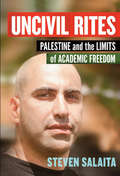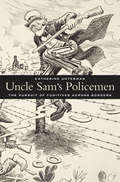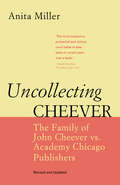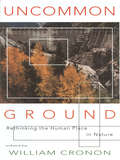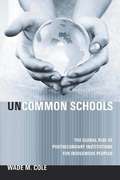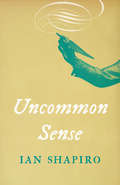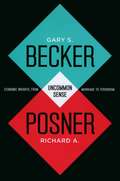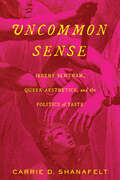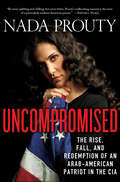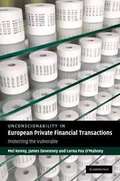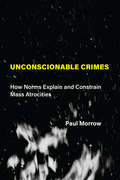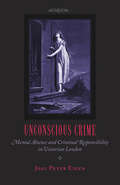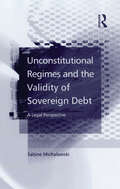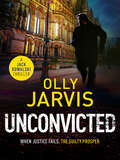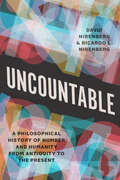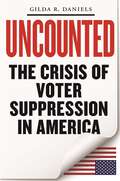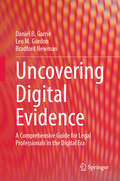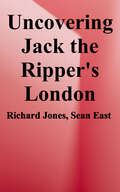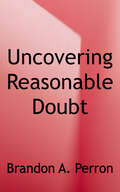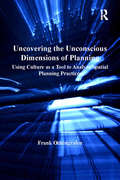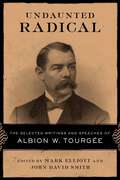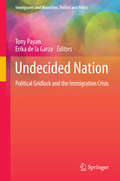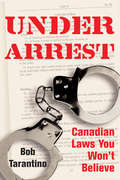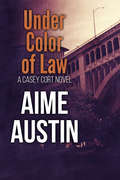- Table View
- List View
Uncivil Rites
by Steven SalaitaIn the summer of 2014, renowned American Indian studies professor Steven Salaita had his appointment to a tenured professorship revoked by the board of trustees of the University of Illinois at Urbana-Champaign. Salaita's employment was terminated in response to his public tweets criticizing the Israeli government's summer assault on Gaza.Salaita's firing generated a huge public outcry, with thousands petitioning for his reinstatement, and more than five thousand scholars pledging to boycott UIUC. His case raises important questions about academic freedom, free speech on campus, and the movement for justice in Palestine.In this book, Salaita combines personal reflection and political critique to shed new light on his controversial termination. He situates his case at the intersection of important issues that affect both higher education and social justice activism.ependent scholar.
Uncle Sam's Policemen: The Pursuit of Fugitives across Borders
by Katherine UntermanExtraordinary rendition--abducting criminal suspects around the world--has been criticized as an unprecedented expansion of U.S. policing. But America's pursuit of fugitives beyond its borders predates the Global War on Terror. Katherine Unterman shows that the extension of manhunts into foreign lands formed an important chapter in American empire.
Uncollecting Cheever: The Family of John Cheever vs. Academy Chicago Publishers
by Anita MillerThe story of how little Academy Chicago Publishers (co-owned by the author and her husband, Jordan Miller) tried to publish the late John Cheever's uncollected short stories, and was blocked from doing so by Cheever's family, is now a familiar part of publishing lore (and law).
Uncommon Ground: Rethinking the Human Place in Nature
by William CrononA controversial, timely reassessment of the environmentalist agenda by outstanding historians, scientists, and critics. In a lead essay that powerfully states the broad argument of the book, William Cronon writes that the environmentalist goal of wilderness preservation is conceptually and politically wrongheaded. Among the ironies and entanglements resulting from this goal are the sale of nature in our malls through the Nature Company, and the disputes between working people and environmentalists over spotted owls and other objects of species preservation. The problem is that we haven't learned to live responsibly in nature. The environmentalist aim of legislating humans out of the wilderness is no solution. People, Cronon argues, are inextricably tied to nature, whether they live in cities or countryside. Rather than attempt to exclude humans, environmental advocates should help us learn to live in some sustainable relationship with nature. It is our home.
Uncommon Schools
by Wade M. ColePostsecondary institutions for indigenous peoples emerged in the late 1960s, just as other special purpose colleges based on gender or race began to close. What accounts for the emergence of these distinctive institutions? Though indigenous students are among the least populous, the poorest, and the most educationally disadvantaged in the world, they differ from most other racial, ethnic, cultural, and linguistic minorities by virtue of their exceptional claims to sovereignty under international and domestic law. Uncommon Schools explores the emergence of postsecondary institutions for indigenous peoples worldwide, with a focus on developments in the United States, Canada, Australia, and New Zealand. Providing the opportunity to examine larger social, political, and legal processes, it traces the incorporation of indigenous peoples into nation-states, the rise of a global indigenous rights movement, and the "massification" of postsecondary education while investigating the variety of ways these culturally relevant colleges differ from each other and from other postsecondary institutions.
Uncommon Sense
by Ian ShapiroA spirited defense of the Enlightenment against assaults from both the left and the right that explains its urgent implications for our contemporary politics Ours is an age when optimism about politics is hard to come by. Ian Shapiro explains why this is so and, without minimizing the daunting challenges, spells out an appropriate response. Written in the indomitable spirit exemplified by Tom Paine, Uncommon Sense is a rich source of insight and inspiration in dark political times. The Enlightenment commitments to reason and science are under assault from the Postmodern Left and the Authoritarian Right. Shapiro explains why the attacks are misguided and politically destructive. He agrees with the critics that there are no universal principles of justice that transcend political battles and no fair, impartial rules to govern the distribution of income, wealth, rights, or opportunities. But abandoning the search for them as futile does not mean junking the Enlightenment&’s core political goal: to deploy the tools of reason and science to fight domination. Democracy is essential to vindicating that goal, yet citizens in many democracies are profoundly alienated and many democracies are in danger of failing. Shapiro explains what has gone wrong, debunks ill-considered remedies, and spells out better ones—deepening and extending his previous writing on political theory and democratic politics.
Uncommon Sense: Economic Insights, from Marriage to Terrorism
by Richard A. Posner Gary S. BeckerA commentary on current events and economic issues, gathering the authors' most important and innovative entries.
Uncommon Sense: Jeremy Bentham, Queer Aesthetics, and the Politics of Taste
by Carrie D. ShanafeltInfamous for authoring two concepts since favored by government powers seeking license for ruthlessness—the utilitarian notion of privileging the greatest happiness for the most people and the panopticon—Jeremy Bentham is not commonly associated with political emancipation. But perhaps he should be. In his private manuscripts, Bentham agonized over the injustice of laws prohibiting sexual nonconformity, questioning state policy that would put someone to death merely for enjoying an uncommon pleasure. He identified sources of hatred for sexual nonconformists in philosophy, law, religion, and literature, arguing that his goal of "the greatest happiness" would be impossible as long as authorities dictate whose pleasures can be tolerated and whose must be forbidden. Ultimately, Bentham came to believe that authorities worked to maximize the suffering of women, colonized and enslaved persons, and sexual nonconformists in order to demoralize disenfranchised people and prevent any challenge to power.In Uncommon Sense, Carrie Shanafelt reads Bentham’s sexual nonconformity papers as an argument for the toleration of aesthetic difference as the foundation for egalitarian liberty, shedding new light on eighteenth-century aesthetics and politics. At odds with the common image of Bentham as a dehumanizing calculator or an eccentric projector, this innovative study shows Bentham at his most intimate, outraged by injustice and desperate for the end of sanctioned, discriminatory violence.
Uncompromised: The Rise, Fall, and Redemption of an Arab-American Patriot in the CIA
by Nada Prouty"Nada Prouty served her country loyally, with distinction, and, as universally acknowledged by her colleagues, with great personal courage as a CIA covert officer. This tale of rampant trampling of citizen's rights is a vivid reminder of the responsibility of citizens to be vigilant against unaccountable government overreach if we hope to keep a strong democracy, where the rule of law prevails and where a citizen is presumed innocent until proven guilty." -Valerie Plame, author of Fair GameWhen Nada Prouty came to the United States as a young woman, she fell in love with the democracy and freedom of her new home. After a childhood in war-torn Lebanon with an abusive father and facing the prospect of an arranged marriage, she jumped at the chance to forge her own path in America-a path that led to exciting undercover work in the FBI, then the CIA. As a leading agent widely lauded by her colleagues, she worked on the most high-profile terrorism cases in recent history, including the hunt for Saddam Hussein and the bombing of the USS Cole, often putting her life on the line and usually getting her man.But all this changed in the wake of 9/11, at the height of anti-Arab fervor, when federal investigators charged Prouty with passing intelligence to Hezbollah. Lacking sufficient evidence to make their case in court, prosecutors went to the media, suggesting that she had committed treason. Prouty, dubbed "Jihad Jane" by the New York Post, was quickly cast as a terrorist mastermind by the relentless 24-hour news cycle, and a scandal-hungry public ate it up.Though the CIA and federal judge eventually exonerated Prouty of all charges, she was dismissed from the agency and stripped of her citizenship. In Uncompromised, Prouty tells her whole story in a bid to restore her name and reputation in the country that she loves. Beyond a thrilling story of espionage and betrayal, this is a sobering commentary on cultural alienation, the power of fear, and what it means to truly love America.
Unconscionability in European Private Financial Transactions
by Mel Kenny James Devenney Lorna Fox O'MahonyGiven the unprecedented recent turmoil on financial markets we now face radically challenged, 'post-Lehmann' assumptions on protecting the vulnerable in financial transactions. This collection of essays explores conceptions of, and responses to, unconscionability and similar notions across Europe with specific reference to financial transactions. It presents a detailed analysis of concepts of unconscionability in Europe against a backdrop of Commission initiatives aimed, variously, at securing a single market in financial services, producing greater coherence in EC consumer protection law and consolidating European private law. This analysis illustrates, for example, that concepts of unconscionability depend on context and can be shaped by a variety of factors. It also illustrates that jurisdictions may choose to respond to questions of unconscionability through a variety of legal instruments located in different branches of the law rather than through a single doctrine. Thus this collection illuminates many of the obstacles facing harmonisation in this area.
Unconscionable Crimes: How Norms Explain and Constrain Mass Atrocities
by Paul C. MorrowThe first general theory of the influence of norms--moral, legal and social--on genocide and mass atrocity.How can we explain--and prevent--such large-scale atrocities as the Holocaust? In Unconscionable Crimes, Paul Morrow presents the first general theory of the influence of norms--moral, legal and social--on genocide and mass atrocity. After offering a clear overview of norms and norm transformation, rooted in recent work in moral and political philosophy, Morrow examines numerous twentieth-century cases of mass atrocity, drawing on documentary and testimonial sources to illustrate the influence of norms before, during, and after such crimes.
Unconscious Crime: Mental Absence and Criminal Responsibility in Victorian London
by Joel Peter EigenA sleepwalking, homicidal nursemaid; a "morally vacant" juvenile poisoner; a man driven to arson by a "lesion of the will"; an articulate and poised man on trial for assault who, while conducting his own defense, undergoes a profound personality change and becomes a wild and delusional "alter." These people are not characters from a mystery novelist's vivid imagination, but rather defendants who were tried at the Old Bailey, London's central criminal court, in the mid-nineteenth century. In Unconscious Crime, Joel Peter Eigen explores these and other cases in which defendants did not conform to any of the Victorian legal system's existing definitions of insanity yet displayed convincing evidence of mental aberration. Instead, they were—or claimed to be—"missing," "absent," or "unconscious": lucid, though unaware of their actions.Based on extensive research in the Old Bailey Sessions Papers (verbatim courtroom narratives taken down in shorthand during the trial and sold on the street the following day), Eigen's book reveals a growing estrangement between law and medicine over the legal concept of the Person as a rational and purposeful actor with a clear understanding of consequences. The McNaughtan Rules of l843 had formalized the Victorian insanity plea, guiding the courts in cases of alleged delusion and derangement. But as Eigen makes clear in the cases he discovered, even though defense attorneys attempted to broaden the definition of insanity to include mental absence, the courts and physicians who testified as experts were wary of these novel challenges to the idea of human agency and responsibility. Combining the colorful intrigue of courtroom drama and the keen insights of social history, Unconscious Crime depicts Victorian England's legal and medical cultures confronting a new understanding of human behavior, and provocatively suggests these trials represent the earliest incarnation of double consciousness and multiple personality disorder.
Unconstitutional Regimes and the Validity of Sovereign Debt: A Legal Perspective
by Sabine MichalowskiSabine Michalowski's work provides a much-needed legal perspective on the topical subject of Developing World debt repayment. The volume incorporates a single debtor country, Argentina, as an example to address global questions relating to this problem. The work assesses the range of complex issues involved in the context of international as well as national law. It further examines the political pressure creditors may apply to make vulnerable countries adapt their economic and other policies in line with their wishes. These raise obvious constitutional issues for the debtor country and pose questions of whether and how the inequality of bargaining power in such situations could influence the validity of any measures taken, whether contractual or legislative. Argentina has been chosen as a case study because as a large debtor country, it represents these sorts of issues.
Unconvicted (A Jack Kowalski Thriller)
by Olly JarvisA Polish-British barrister takes on two trials that could jeopardize his career in this razor-sharp legal thriller by the author of Cut-throat Defence. Junior barrister Jack Kowalski is crushed. His client Timothy Smart appears to have committed a monstrous crime while on bail – a bail application Jack fought hard to win. When a high-profile Polish footballer is charged with rape and demands a fellow countryman represent him, Jack must overcome his guilt and get back to work. Before long he takes on a second case, a GBH for instructing solicitor Lara Panassai, who Jack remains desperate to impress. But neither case is what it seems, and Jack will face an extraordinary uphill battle to see that justice is done . . . The second Jack Kowalski novel, Unconvicted is a gripping courtroom drama written with the expert insight of a practicing criminal barrister, perfect for fans of William L. Myers, Deborah Hawkins, and Scott Turow.
Uncountable: A Philosophical History of Number and Humanity from Antiquity to the Present
by David Nirenberg Ricardo L. NirenbergRanging from math to literature to philosophy, Uncountable explains how numbers triumphed as the basis of knowledge—and compromise our sense of humanity. Our knowledge of mathematics has structured much of what we think we know about ourselves as individuals and communities, shaping our psychologies, sociologies, and economies. In pursuit of a more predictable and more controllable cosmos, we have extended mathematical insights and methods to more and more aspects of the world. Today those powers are greater than ever, as computation is applied to virtually every aspect of human activity. Yet, in the process, are we losing sight of the human? When we apply mathematics so broadly, what do we gain and what do we lose, and at what risk to humanity? These are the questions that David and Ricardo L. Nirenberg ask in Uncountable, a provocative account of how numerical relations became the cornerstone of human claims to knowledge, truth, and certainty. There is a limit to these number-based claims, they argue, which they set out to explore. The Nirenbergs, father and son, bring together their backgrounds in math, history, literature, religion, and philosophy, interweaving scientific experiments with readings of poems, setting crises in mathematics alongside world wars, and putting medieval Muslim and Buddhist philosophers in conversation with Einstein, Schrödinger, and other giants of modern physics. The result is a powerful lesson in what counts as knowledge and its deepest implications for how we live our lives.
Uncounted: The Crisis of Voter Suppression in America (Elie Wiesel Center for Judaic Studies)
by Gilda R DanielsA history of the methods used to assault voting rights in America from the 1960s to 2020. The Voting Rights Act of 1965 is considered one of the most effective pieces of legislation the United States has ever passed. It enfranchised hundreds of thousands of voters, particularly in the American South, and drew attention to the problem of voter suppression. Yet in recent years there has been a continuous assault on access to the ballot box in the form of stricter voter ID requirements, meritless claims of rigged elections, and baseless accusations of voter fraud. In the past these efforts were aimed at eliminating African American voters from the rolls, and today, new laws seek to eliminate voters of color, the poor, and the elderly, groups that historically vote for the Democratic Party. Uncounted examines the phenomenon of disenfranchisement through the lens of history, race, law, and the democratic process. Gilda R. Daniels, who served as Deputy Chief in the United States Department of Justice Civil Rights Division and has more than two decades of voting rights experience, argues that voter suppression works in cycles, constantly adapting and finding new ways to hinder access for an exponentially growing minority population. She warns that a premeditated strategy of restrictive laws and deceptive practices has taken root and is eroding the very basis of American democracy―the right to vote!
Uncovering Digital Evidence: A Comprehensive Guide for Legal Professionals in the Digital Era
by Daniel B. Garrie Leo M. Gordon Bradford NewmanThis book serves as a comprehensive guide for legal practitioners, providing a primer on digital forensic evidence and essential technological concepts. Through real-world examples, this book offers a systematic overview of methodologies and best practices in collecting, preserving, and analyzing digital evidence. Grounded in legal precedent, the following chapters explain how digital evidence fits within existing legal frameworks, addressing questions of admissibility, authenticity, and ethical considerations. The aim of this book is to bridge the digital knowledge gap that often hinders the legal process, empowering readers with the tools needed for effective engagement in tech-related legal matters. Ultimately, the book equips judges, lawyers, investigators, and jurists with the knowledge and skills to navigate the digital dimensions of legal cases proficiently.
Uncovering Jack the Ripper's London
by Richard JonesThe crimes of Jack the Ripper have gone down in history as some of the most brutal and violent ever committed. These horrendous acts of serial murder confounded the police at the time, and the mystery of the Ripper's identity remains unsolved to this day. <p><p>In addition to the sense of fear and panic the murders brought to the London streets of the late 1880s, they also shed a harsh light on the impoverished and dangerous conditions of the East End and brought numerous tensions to boiling point. <p><p>This book examines the wider context of the murders, taking into account the social conditions against which they were committed, the animosity between police and press, the instances of anti-Semitism and the physical geography of the area now and then. Providing detailed analysis of the attacks and the investigation, the book also considers acts committed before and after that could also have been the work of the same person. Featuring previously unpublished documents and photographs, this book is a must for all Jack the Ripper enthusiasts.
Uncovering Reasonable Doubt: The Component Method - A Comprehensive Guide for the Criminal Defense Investigator
by Brandon A. PerronA comprehensive guide for the criminal defense investigator. The philosophical and methodical approaches to the discipline of criminal defense investigation are discussed and presented in an easy to follow format. Written for public defender investigators and private investigators engaged in the field of criminal defense investigation. Includes, case studies, diagrams, and checklists.
Uncovering the Unconscious Dimensions of Planning: Using Culture as a Tool to Analyse Spatial Planning Practices
by Frank OthengrafenIf planning is understood to be about the nature of place, about the way in which we use land, and about the physical expression of the ordering of society, then it becomes apparent that planning as an activity cannot possibly be divorced from the general cultural traditions that inform it. By adopting theoretical approaches from the fields of management studies, cultural studies and anthropology, and by using culture as an organising principle, this book develops an innovative framework which provides better insights into what culture is about, what the relations are between culture and planning and how culture influences planning practices. It introduces a 'culturised planning model', consisting of the analytical dimensions: 'planning artefacts', 'planning environment' and 'societal environment', with which to discover the unconscious routines and assumptions, emotions and meanings attached to planning systems and the different concepts used in spatial planning systematically. The model offers the possibility of uncovering cultural phenomena in spatial planning by providing relevant cultural dimensions and potential specifications and indicators which has not been the case so far. By comparing examples of German, Finnish and Greek planning habits, the book illustrates cultural influence in planning and provides the readership with a feedback between the micro (experiences of planners) and the macro level (institutional and social context) as well as a more systematic comparison based on cultural values, attitudes, norms and rules.
Undaunted Radical: The Selected Writings and Speeches of Albion W. Tourgée (Conflicting Worlds: New Dimensions of the American Civil War)
by Mark Elliott John David SmithA leading proponent of racial equality in the United States during the second half of the nineteenth century, Albion W. Tourgée (1838--1905) served as the most articulate spokesman of the radical wing of the Republican party, and he continued to advocate for its egalitarian ideals long after Reconstruction ended. Undaunted Radical presents Tourgée's most significant letters, speeches, and essays from the commencement of Radical Reconstruction through the bleak days of the era of Jim Crow.An Ohioan by birth, Tourgée served in the Union army and afterwards moved to North Carolina, where he helped draft the 1868 state constitution. Within that and other documents he proposed free public education, the abolition of whipping posts, the end of property qualifications for jury duty and office holding, and the initiation of judicial reform and uniform taxation. Tourgée also served as a Republican-installed superior court judge, a position that brought him into increasing conflict with the Ku Klux Klan. In 1879, he published A Fool's Errand, a bestselling novel based on his Reconstruction experiences. Although now often overlooked, Tourgée in his lifetime offered a prominent voice of reason amid the segregation, disenfranchisement, lynching, racial propaganda, and mythologies about African Americans that haunted Reconstruction-era society and Gilded Age politics. These thirty-four documents elaborate the reformer's opinions on the Reconstruction Amendments, his generation's racial and economic theories, the cultural politics of North-South reconciliation, the ethics of corporate capitalism, the Social Gospel movement, and the philosophical underpinnings of American democratic citizenship. Mark Elliott and John David Smith, among the foremost authorities on Tourgée, have brought these writings, including the previously unpublished oral arguments Tourgée delivered before the U.S. Supreme Court as Homer Plessy's lead attorney in Plessy v. Ferguson (1896), together in one volume. The book also includes an introductory overview of Tourgée's life and an exhaustive bibliography of Tourgée's writings and related works, providing an essential collection for anyone studying Reconstruction and the early civil rights movement.
Undecided Nation
by Tony Payan Erika de la GarzaThere is a broad consensus that the United States' immigration system is broken, yet the political momentum behind the movement has not yet led to a consensus on how to fix it. This momentum has stemmed from the agreement that we have an immigration "crisis" on our hands - millions of undocumented immigrants living and working in the United States under increasingly harsh conditions, tremendous spending on border security and enforcement measures without protection of civil rights, changing voter demographics, and other pressing issues have ushered in the moment for immigration reform. This book presents research and policy recommendations from leading U. S. immigration experts and scholars, who have many valuable insights and nuanced perspectives to offer to the current debate on immigration reform. The goal of this immigration study is to disseminate knowledge and policy recommendations to scholars, government officials, the media, and the general policy community on vital issues regarding the present question of immigration reform. This book discusses the future prospects of immigration reform and delves into various details, options, and obstacles related to immigration reform. The chapters presented shed light on a number of issues that are currently being debated in the immigration bill. Some of them address the salience of the immigration issue in Latino political behavior and the impact of demographic context. Other papers hone in on the landscape of legislative initiatives addressing immigration at the state and local levels, and some authors address the implications of immigration reform for the labor market and economic climate. The book will be of interest to both scholars and policy-makers concerned with immigration in the United States.
Under Arrest: Canadian Laws You Won't Believe
by Bob TarantinoDid you know that Canada’s Criminal Code still has provisions outlawing the practice of witchcraft and "crafty sciences"? Did you know that blasphemy is a crime in Canada? And did you know that putting a picture of a red poppy on your website could get you in trouble with the Royal Canadian Legion? Lawyer and author Bob Tarantino takes readers on an entertaining and informative romp through Canada’s legal labyrinths in a book that spotlights the country’s past and present strange-but-true laws and legal history. He examines odd statutes and arcane jurisprudence across the spectrum of Canadian endeavours, from war and religion to sex and culture to politics and business. Frequently, he demonstrates the parallels between yesterday’s prohibitions and today’s trends such as the edict against duelling and the legalities of twenty-first-century hockey slugfests, or the confiscation of so-called crime comics in the 1950s and the controversy surrounding violence in contemporary video games.
Under Color of Law: A Casey Cort Novel (A Casey Cort Novel #2)
by Sylvie FoxLosing the most high profile case of her career ironically made Casey Cort a winner. Well-heeled clients now knock on her door, and Tom Brody, her rich ex-boyfriend, wants her back. But entry into the upper echelon comes at a price. The newest assistant United States attorney, Miles Siegel, has set his sights on nailing a public figure he believes to be corrupt: Cuyahoga County Juvenile Court Judge Eamon Brody. But Brody's brothers, one the presiding judge of the county, the other the state attorney general, aren't about to let that happen. When Casey gets retained by single mom Claire Henshaw, to wrest custody from her son's irresponsible father, Casey handles her first case before the controversial judge . . . and learns something that will force her to make the hardest decision of her life. In this continuation of the Casey Cort series, Sylvie Fox--a former trial lawyer in Cleveland--weaves a tale that blends the best of today's top legal thrillers with the heart and soul of women's fiction, in a story ripped from real-world headlines.
Under Cover of Science: American Legal-Economic Theory and the Quest for Objectivity
by James R. Hackney Jr.For more than two decades, the law and economics movement has been one of the most influential and controversial schools of thought in American jurisprudence. In this authoritative intellectual history, James R. Hackney Jr. situates the modern law and economics movement within the trajectory of American jurisprudence from the early days of the Republic to the present. Hackney is particularly interested in the claims of objectivity or empiricism asserted by proponents of law and economics. He argues that the incorporation of economic analysis into legal decision making is not an inherently objective enterprise. Rather, law and economics often cloaks ideological determinations--particularly regarding the distribution of wealth--under the cover of science. Hackney demonstrates how legal-economic thought has been affected by the prevailing philosophical ideas about objectivity, which have in turn evolved in response to groundbreaking scientific discoveries. Thus Hackney's narrative is a history not only of law and economics but also of select strands of philosophy and science. He traces forward from the seventeenth-century the interaction of legal thinking and economic analysis with ideas about the attainability of certitude. The principal legal-economic theories Hackney examines are those that emerged from classical legal thought, legal realism, law and neoclassical economics, and critical legal studies. He links these theories respectively to formalism, pragmatism, the analytic turn, and neopragmatism/postmodernism, and he explains how each of these schools of philosophical thought was influenced by specific scientific discoveries: Newtonian physics, Darwin's theory of evolution, Einstein's theories of relativity, and quantum mechanics. Under Cover of Science challenges claims that the contemporary law and economics movement is an objective endeavor by historicizing ideas about certitude and empiricism and their relation to legal-economic thought.
